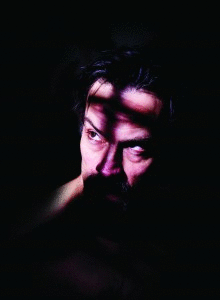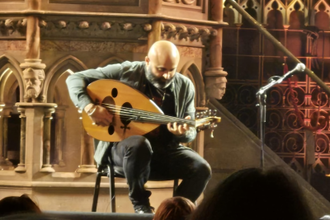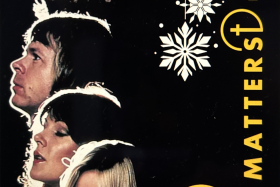Review: The Devil's Passion

The Devil's Passion or Easter in Hell, At CRYPT ON THE GREEN, St James Church, Clerkenwell
Going to see a play entitled The Devil's Passion or Easter in Hell in Holy Week might set alarm bells ringing for the faithful, but, be assured, Justin Butcher's 'divine comedy in one act', while indeed full of dazzling wit, is a magnificent and profound religious drama, worthy of Dante.
Butcher, who once played the 'demi-devil' Iago in Othello when a student, has had a rich and exciting musical and theatrical career, penning celebrated works performed by Pete Postlethwaite and David Suchet among others, but here he plays in his own one-man piece, both as Satan and also every other part in this Salvation history. I was thrilled and moved by his physical and vocal range, energy and the beautifully conceived and composed narrative: a range of story-telling and re-enactment.
The play opens with Satan striding to a podium, suited, debonair, presidential, announcing, 'after a three-year hunt', the fruition tonight of 'a meticulously planned counter-terrorism sting.' The topical satire is delicious. With a nod to Paradise Lost, Satan casts himself as leader of the 'free world' against fanatical enemies of freedom, in thrall to a 'stagnant tyranny of mindless orthodoxy' and an autocratic deity. Victory is in sight: 'Within the next hour, our operatives will isolate, engage and capture or kill the notorious leader of the most extreme, dangerous and contagious ideology to emerge in the modern era, whose terror activities represent the gravest threat to our interests across the region and the wider world. I refer, of course, to the radical preacher and populist demagogue Y'shua Bar-Yessuf - the man known, by way of shorthand to our operatives, as "Jesus".'
No sooner than these words are proclaimed, Satan kicks over the podium and strips down to vest and trousers. He is going to feel the heat.
He proceeds to recount, and enact, the backstory:
'It begins with a girl. A schoolgirl, maybe 15 years old. In an occupied territory, Palestine. The biblical kingdom of Israel no longer. A fading dream of ancient pride, long ago.'
Miriam (Mary) is praying.
'Take note, you theorists of political science and military strategists. Crush a people too heavily, squeeze 'em too hard, and they pray. And that's where it starts, the radicalisation, the recruitment - they pray, and they dream, and they pray.'
'The shadow grows across the courtyard. Wings? A thrill of fear swarms through her chest, her heart leaps, eyes brimming and … [as Mary] why do I want to laugh? What is this … joy flooding, coursing through me?'
Throughout, Butcher alternates between wholeheartedly inhabiting each role he plays and intersplicing the narrative with ironic and mocking asides from himself as the Devil. He also embraces anachronism in the best traditions of the medieval mysteries (and Shakespeare) where past and present mutually inform each other and interfuse in salvation chronology.
'The door of life opens within her. God and human essence fuse. A fragile germ conceived. The first gate falls. The enemy enters in.'
Butcher's 'falling gates' leitmotif proves an inspired and gripping engagement with the Harrowing of Hell tradition of Holy Saturday (today), derived from the Gospel of Nicodemus, which recounts how Christ descended into Hell and freed those within - as notably performed in the York Mysteries passion pageant. Psalm 24 (Atollite portas) was sung in remembrance of Jesus passing through Hell's gates: 'Lift up your heads, open up ancient doors, let the King of Glory enter.'
The shapeshifting Prince of Lies re-enacts the Temptation in the Wilderness in which he plays a scrawny vulture, a chirruping cricket and a beguiling 'still, small voice' - lovely, powerful and precise physicalisation complements the writerly range and brings all manner of thought-provoking resonances. Mirage-like, the vulture calls to mind the ravens who fed Elijah in the desert.
Christ says: '"Begone from me, Satan! For so it is written: you shall worship the Lord your God alone. Him only shall you serve." And my still, small voice erupts into a splitting howl, smashing into pieces against the unity of Jesus. And the second gate, the gate of flesh, falls.' After this rebuff, Satan launches into a delicious rant against 'homogeneous monochrome globalised goodness. Nature abhors the monoculture!' He prefers, 'Cluster bomblets of pain spreading, like ripples from a tiny pebble's plop, to eternity.' Not for him the 'flatulent pomposity of voices in polyphony - William Byrd, Orlando Gibbons and Thomas bloody Tallis farting peace and praise in forty-part motets [an hilarious echo of Milton's 'warbled hallelujahs' here]. Give me the chaos of warring voices, jarring sounds and clashing noise, polyphony of pandemonium, and I will fill the world with wonder!'
The rant is an apt segue-way into the torment of the glaze-eyed demoniac of Gadara - 'My name is Legion for we are many' - and a mass porcine panic as the maniac is healed by Christ. Superb physicalisation and eye-work here. The gate of victims falls. Then follows a profoundly moving healing of the woman with the issue of blood and a clear-eyed exposé of patriarchal cruelty. The woman's stretching to 'but touch' the hem of Jesus's garment is a tableau evocative of Michelangelo's digital connection between God and Adam. Her faith has made her whole. The gate of shame is burst open.
The gate of enmity is next to cave in with a lovely comic shift of tone and mood: Christ's encounter with the Samaritan woman by the well - 'the village bicycle', Satan calls her. For Christ, the time is coming when believers will worship 'in spirit and in truth'. ('Mmm, stick that on your passport and come on in, fast track!' says Satan.) The next gate to fall is that of Mammon when Christ invites himself to the house of a 'perfectly repugnant little reptile named Zacchaeus' - the turncoat collaborator tax collector. Zacchaeus come out radicalised and Satan duly cites the verse-form parable of Dives and Lazarus which Jesus had told him. It ends, mystery cycle-like, with a challenge to the audience:
How is it, since this story first was heard
So long ago in Jericho and Galilee,
That Lazarus today is still not free?
How comes it that he lies still at your gate?
Will you release him from his wretched fate?
How many more millennia must he wait?
(There is an uncanny resemblance to the challenge posed by Linton Kwesi Johnson in 'Blair Peach' here. I wonder if Butcher knows that dub poem.)
No sooner is the parable recounted when Satan says: 'See where he rides now, Y'shua Bar-Yessuf, Jesus the young Lord God Himself, riding up the royal road to the Holy City, Jerusalem, on a donkey - ostentatiously humble, as always.' Of course, he is playing the donkey. 'Welcome to Jerusalem, Son of David, the charnel-house of history!' And the whirligig of time traces the battle-paths of invaders, 'Saracens, Babylonians, Romans, Crusaders', and whizzes by the Wailing Wall, the Dome of the Rock, and the Church of the Holy Sepulchre. "So, just say the word, your majesty, and I'll turn into a warhorse, an armoured car or a Merkava Mark 4 tank, and then we'll have some fun. Hee-haw!"
A burlesque contemporary tour guide's unctuous spiel is then interrupted by Christ's expulsion of the Temple money-lenders and traders - 'I came to a house of prayer and found instead a stock exchange!' The gate of piety falls.
Next, a tense wait for Jesus who 'went off radar', only to re-surface in Bethany saying 'Get behind me Satan', before the Devil recounts how he entered Judas Iscariot who proceeded to run weeping and raving to Caiaphas, the High Priest, played as a lovely depiction of a suave and worldly politician: 'One more episode like that ridiculous palm-branch promenade last Sunday, or even worse, that scandalous act of hooliganism in the Temple precincts, and we'll all be under the axe!'
'The last port of call, the Upper Room,' avers Satan. 'After this we've got him.'
Except that as Jesus breaks the bread - 'This is my body, broken for you' - and passes the cup - 'This is my blood of the new covenant, which will be poured out for you' - Satan recalls with horror his interpretation of events: 'A suicide mission. Of course. He knows what's coming, he's been playing us all along. He's planning to die. … How could I have been so blind? He's coming here. This is his plan, to assault the gates of death and hell?'
Too late, he seeks to order Judas to 'abort the mission' as Christ prepares 'on this darkest of nights' of Passover to cross the forbidden threshold, the eight gate, the gate of fear. A sadistic Satan leaves us in no doubt of Christ's Agony in the Garden.
Nevertheless, nothing it seems can avert 'the biggest own goal in the history of Hell'. But still Satan will not give up. He addresses the 'none-too perky-looking' Jesus suffering on the cross, predicting that his death will all be for nought in a harangue inspired directly by Dario Fo's Mistero Buffo. 'By the time they're done, they'll make you into the prettiest wee manikin that ever graced a pulpit panel! ... Then this cross of yours - they'll have it marching at the head of armies, summoning men to come and spill each other's guts in the sand ... Judas was the first to betray you, but there's millions of them out there waiting to do the same. … Is there even one person out there you might begin to think it was worth dying for?' Yet, 'Even as he cries out in agony, "Eloi, eloi, lama sabacthani, My God, my God, why hast Thou forsaken me?" in that moment, I know that for him, one - just one - would be enough.'
Mary is there at the foot of the cross. ' "All the pain and misery He will spin to finest gold. Evil and violence will eat themselves. And this sight that pierces my heart, this senseless, unjust, lunatic sacrifice, my own son bleeding the hurts of the world, will tear open the heavens and bring Paradise down at last to the dying earth." Jesus gives a great cry, "It is finished!" …"Father, into Your hands …" The sky turns black. "… I commit my spirit!" He breathes his last. The earth sighs, and shakes beneath me. The Temple curtain is ripped in twain, from top to bottom. God is dead. And I flee in terror, back into Hell.' Throughout this last scene, Butcher has had the 'shadow' of the cross fall over his face as a shaft of light (inspired by RL Stevenson's moon-beam falling on Jim Hawkins in Treasure Island, as he hid from the buccaneers in an apple barrel).
The Devil's Passion is a coup de théâtre, a profound meditation on Christ's Gospel of Love and the Passion enacted with a deceptive directness and simplicity which conceals its great theological and dramaturgical depths. It would be moving indeed to see it tonight on Holy Saturday but I urge impresarios to book it for long runs and tours. An excellent and profoundly moving creation by Justin Butcher and directed with aplomb by Guy Masterson.
Dr Philip Crispin is a Lecturer in Drama at the University of Hull
The Devil's Passion
or Easter in Hell
At CRYPT ON THE GREEN
Clerkenwell Close, London EC1R 0EA
5 mins. walk from Farringdon tube & rail
SAT 20th APRIL 2.30pm & 6.30pm
£17 full price/£14 concession
BOOK TICKETS: https://thedevilspassioncryptonthegreen.bpt.me
TELEPHONE BOOKINGS: 0800 411 8881


















